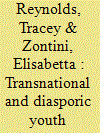| Srl | Item |
| 1 |
ID:
083843


|
|
|
|
|
| Publication |
2008.
|
| Summary/Abstract |
The paper argues that a project to re-member China lies embedded in The Monster that Is History as Wang examines the monstrous violence which ravages modern China through the lenses of fiction. Through the alchemy of what the author calls 'diasporic ambivalence', it finally assumes the form of huawen wenxue, or Sinophone literature. As the project inevitably encounters resistance from the Taiwanese nativist, it falls into an aporia/differend between Sinophone and Taiwanese literature as struggling means to constitute a community formation.
*This paper comes from the author's MA thesis in comparative literature from the University of Washington. During the writing of the thesis, Professor Francisco Kiko Benetiz, my principal advisor, and Professor Yomi Braester, my reader, provided patient, careful and invaluable guidance. I have benefited tremendously from their comments and criticisms, though I alone, of course, am responsible for any inadequacy in the paper. I am most fortunate to have them as mentors: To them my deepest gratitude and heartfelt thanks
|
|
|
|
|
|
|
|
|
|
|
|
|
|
|
|
| 2 |
ID:
145862


|
|
|
|
|
| Summary/Abstract |
This special issue brings together multidisciplinary and international perspectives on the importance of diasporic and transnational networks for the formation of ethnic identity by migrant youths. Within the context of this issue migrant youths refer to young people (aged 16–35 years) who are themselves migrants or are children and grandchildren of migrants. Our attention to the transnational and diasporic identities of migrant youths is in direct response to policy debates and migration scholarship in this area, which in recent times have focused on the supposed crisis of minority ethnic youths and their perceived marginalisation and social exclusion from a wider society. The special issue broadens the parameters of this debate by exploring not how transnational migrant youths are but more interestingly, we believe, what it means for them to have grown up in a transnational social field. In the special issue rather than simply addressing identity outcomes, we want to emphasise identity processes. This is because we are more interested in understanding the ways the migrant youths are ‘doing transnationalism’ and also through this process ‘doing identity’ (including intersected racial, ethnic, gender, class and sexual identities).
|
|
|
|
|
|
|
|
|
|
|
|
|
|
|
|